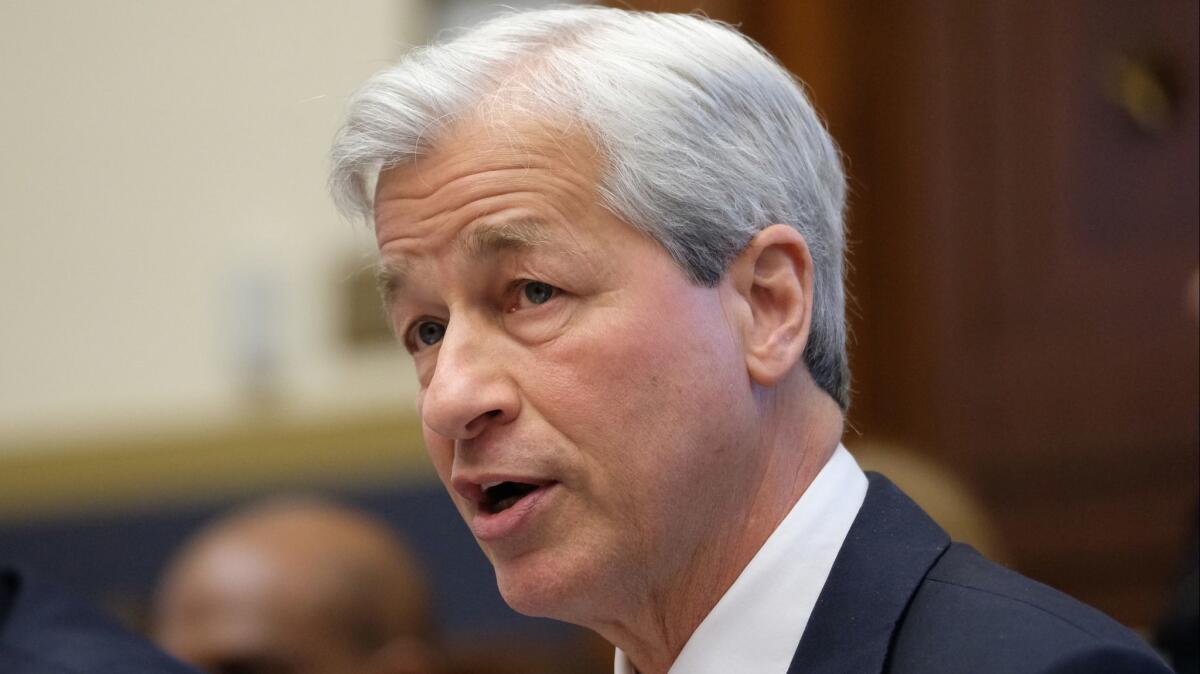Profits for shareholders can’t be companies’ main goal, top CEOs say

- Share via
One of America’s largest business groups has dropped the “shareholder primacy” creed that has driven U.S. capitalism for decades, urging companies to consider the environment and workers’ wellbeing alongside their pursuit of profits.
The Business Roundtable has close to 200 members — including the chief executives of JPMorgan Chase & Co., Amazon.com Inc. and General Motors Co. — which generate a combined $7 trillion in annual revenue. A new “statement of purpose” from the group Monday placed shareholders as one of five stakeholders, alongside customers, workers, suppliers and communities.
It is a significant departure from the bedrock belief that businesses serve the owners of their capital — a philosophy championed by Nobel Prize-winning economist Milton Friedman that has driven corporate America for decades.
Companies should “protect the environment” and treat workers with “dignity and respect” while also delivering long-term profits for shareholders, the Business Roundtable statement said.
The change amounts to a call to reform capitalism in a time in which rising populism and concern about climate change have led politicians and shareholder activists to demand that companies consider their effect on the world beyond their balance sheets.
“It’s an important shift,” said Mohamed El-Erian, chief economic advisor for Allianz. “It reflects an emerging consensus about the importance of more inclusive capitalism.”
The Business Roundtable statement lacks detail on what actions companies could take. It does not mention, for example, increasing wages or cutting carbon emissions.
Larry Summers, who served as U.S. Treasury secretary during the Clinton administration, said that without an enforcement tool, the statement lacked teeth, and that government was notably absent as a stakeholder.
“I’m wary,” Summers said. “I worry the Roundtable’s rhetorical embrace of stakeholders is in part a strategy for holding off necessary tax and regulatory reform.”
The group’s statement was a “paper tiger,” said Espen Eckbo, a professor of finance and founder of the Lindenauer Forum for Governance Research at Dartmouth College.
It “is completely noncommittal because it does not contain any detail that would tell us they are going to change anything,” he said. “It does not bind anybody to anything.”
The Business Roundtable statement may be seen as an effort to assuage political pressure for broad business reforms from the likes of Sens. Elizabeth Warren (D-Mass.) and Bernie Sanders (I-Vt.). Both politicians — who are running for president — have highlighted that U.S. companies are making record profits and spending record amounts on share buybacks while wages have stagnated.
The statement’s language has echoes of a reform bill introduced by Warren last year that would require company directors to consider all corporate stakeholders “including employees, customers, shareholders and the communities in which the company operates.”
Sen. Marco Rubio (R-Fla.) has called for U.S. businesses to think beyond their shareholders and instead take a long-term view to investment, which he thinks will promote employment. In the U.K., Jeremy Corbyn, leader of the opposition Labor party, has also suggested broad corporate reforms.
Larry Fink, chief executive of BlackRock and a member of the Business Roundtable, last year called on businesses to strive to make a positive impact on society in addition to delivering profits. Similar views have been echoed more recently by Ray Dalio, the founder of Bridgewater Associates, and Jamie Dimon, the CEO of JPMorgan and chairman of the Business Roundtable.
The Business Roundtable has recently lobbied to water down shareholder activism. In June, the group asked the Securities and Exchange Commission to increase the threshold for initial proposal submissions, a move that would limit shareholders’ ability to agitate for changes at companies on issues including climate change and executive compensation.
“People are really dissatisfied with capitalism,” said Andy Green, managing director for economic policy at the Center for American Progress, a liberal-leaning think-tank. “We need to see the details to see if they put their money where their mouth is.”
The Financial Times Limited 2019. All rights reserved. FT and Financial Times are trademarks of the Financial Times Ltd. Not to be redistributed, copied or modified in any way. Times staff writer Samantha Masunaga contributed to this report.
More to Read
Inside the business of entertainment
The Wide Shot brings you news, analysis and insights on everything from streaming wars to production — and what it all means for the future.
You may occasionally receive promotional content from the Los Angeles Times.










